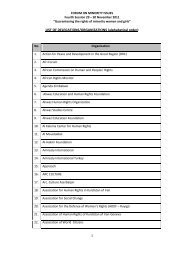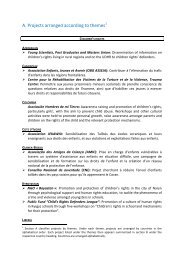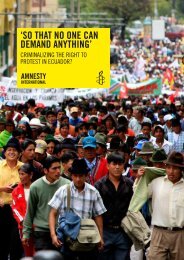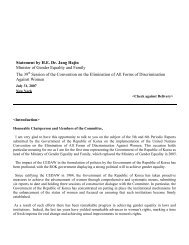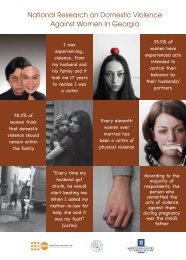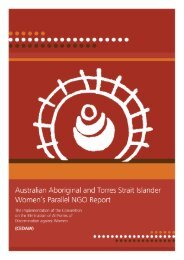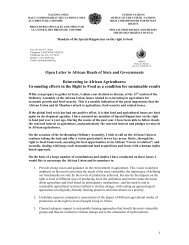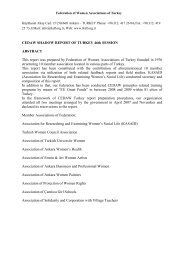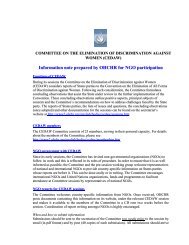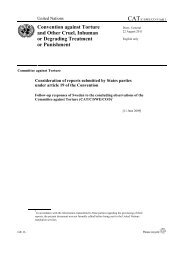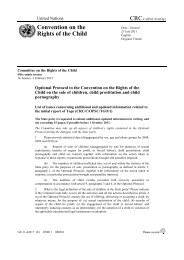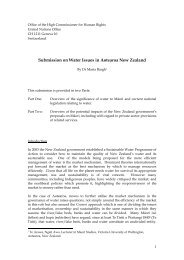Report - Office of the High Commissioner on Human Rights
Report - Office of the High Commissioner on Human Rights
Report - Office of the High Commissioner on Human Rights
- No tags were found...
Create successful ePaper yourself
Turn your PDF publications into a flip-book with our unique Google optimized e-Paper software.
In <str<strong>on</strong>g>the</str<strong>on</strong>g> Pacific, <str<strong>on</strong>g>the</str<strong>on</strong>g>re are a number <str<strong>on</strong>g>of</str<strong>on</strong>g> such informal instituti<strong>on</strong>s which have c<strong>on</strong>stituti<strong>on</strong>al status (as<br />
in Vanuatu, Solom<strong>on</strong>, Fiji, Kiribati, Cook Islands (Solom<strong>on</strong> Islands is in <str<strong>on</strong>g>the</str<strong>on</strong>g> process <str<strong>on</strong>g>of</str<strong>on</strong>g> trying to adopt<br />
<str<strong>on</strong>g>the</str<strong>on</strong>g> Fiji customary law system). They do not have de jure lawmaking authority, but enjoy de facto<br />
lawmaking authority. When <str<strong>on</strong>g>the</str<strong>on</strong>g>y make pr<strong>on</strong>ouncements, <str<strong>on</strong>g>the</str<strong>on</strong>g>ir word is <str<strong>on</strong>g>of</str<strong>on</strong>g>ten taken as law in <str<strong>on</strong>g>the</str<strong>on</strong>g><br />
community and <str<strong>on</strong>g>the</str<strong>on</strong>g>ir authority can precede <str<strong>on</strong>g>the</str<strong>on</strong>g> authority <str<strong>on</strong>g>of</str<strong>on</strong>g> legislators, especially in <str<strong>on</strong>g>the</str<strong>on</strong>g> eyes <str<strong>on</strong>g>of</str<strong>on</strong>g> <str<strong>on</strong>g>the</str<strong>on</strong>g><br />
community. Chiefs are also <str<strong>on</strong>g>of</str<strong>on</strong>g>ten members <str<strong>on</strong>g>of</str<strong>on</strong>g> land courts and village courts (<str<strong>on</strong>g>the</str<strong>on</strong>g> latter are very str<strong>on</strong>g<br />
in Samoa). Sometimes <str<strong>on</strong>g>the</str<strong>on</strong>g>y also get elected to parliament, which creates direct cross-overs between<br />
informal and formal systems <str<strong>on</strong>g>of</str<strong>on</strong>g> governance, giving chiefs authority in both jurisdicti<strong>on</strong>s. Boards<br />
established to administer customary land distributi<strong>on</strong> are also problematic for women, as c<strong>on</strong>servative<br />
male leaders tend to dominate <str<strong>on</strong>g>the</str<strong>on</strong>g>m. Women generally do not have access to <str<strong>on</strong>g>the</str<strong>on</strong>g>se decisi<strong>on</strong>-making<br />
forums. Where women challenge custom, <str<strong>on</strong>g>the</str<strong>on</strong>g>y are penalised.<br />
“In describing <str<strong>on</strong>g>the</str<strong>on</strong>g> penalties placed <strong>on</strong> women who d<strong>on</strong>’t c<strong>on</strong>form to cultural practices<br />
and beliefs, we have to understand that <str<strong>on</strong>g>the</str<strong>on</strong>g> instituti<strong>on</strong> <str<strong>on</strong>g>of</str<strong>on</strong>g> <str<strong>on</strong>g>the</str<strong>on</strong>g> family is at <str<strong>on</strong>g>the</str<strong>on</strong>g> fr<strong>on</strong>t <str<strong>on</strong>g>of</str<strong>on</strong>g><br />
discriminati<strong>on</strong> against women. The cultural resp<strong>on</strong>se is to penalise women for not acting<br />
in c<strong>on</strong>formity with custom, even if it is discriminatory, through harassment, victimisati<strong>on</strong>,<br />
humiliati<strong>on</strong> and exclusi<strong>on</strong>, which results in <str<strong>on</strong>g>the</str<strong>on</strong>g> denial <str<strong>on</strong>g>of</str<strong>on</strong>g> equal housing and land rights,<br />
denial <str<strong>on</strong>g>of</str<strong>on</strong>g> dignity and a violati<strong>on</strong> <str<strong>on</strong>g>of</str<strong>on</strong>g> women’s rights to privacy.” (Susanna Naivaga, Fiji)<br />
In some isolated cases, women have been str<strong>on</strong>g enough to challenge customary laws.<br />
“After my husband died, I went back to my village to ask for a piece <str<strong>on</strong>g>of</str<strong>on</strong>g> land. My s<strong>on</strong>s are<br />
all working, and <str<strong>on</strong>g>the</str<strong>on</strong>g>y know that in time <str<strong>on</strong>g>the</str<strong>on</strong>g>y will come to me in my village. I requested my<br />
fa<str<strong>on</strong>g>the</str<strong>on</strong>g>r for land for my s<strong>on</strong>s and me, i.e. asking for my inheritance for being a female child<br />
in my clan. I was able to do this because I am a human rights advocate and I know my<br />
customary rights, toge<str<strong>on</strong>g>the</str<strong>on</strong>g>r this made me str<strong>on</strong>g so I could ask. I called my fa<str<strong>on</strong>g>the</str<strong>on</strong>g>r and four<br />
bro<str<strong>on</strong>g>the</str<strong>on</strong>g>rs. The land <str<strong>on</strong>g>the</str<strong>on</strong>g>y gave me was st<strong>on</strong>y, out in <str<strong>on</strong>g>the</str<strong>on</strong>g> outskirts, in <str<strong>on</strong>g>the</str<strong>on</strong>g> mountains. I said<br />
no, I want land down in <str<strong>on</strong>g>the</str<strong>on</strong>g> valley. When it comes to land, men expect women to be c<strong>on</strong>tent<br />
with what is given to us and not have a say. That is where men draw <str<strong>on</strong>g>the</str<strong>on</strong>g> line – what is<br />
given to you, you have to take it. When <str<strong>on</strong>g>the</str<strong>on</strong>g> beloved female child speaks out <str<strong>on</strong>g>the</str<strong>on</strong>g>y tell her<br />
to shut up. But I explained, ‘I am a widow, do you expect me to take my basket and knife<br />
and go to <str<strong>on</strong>g>the</str<strong>on</strong>g> mountain’ They said, ‘You have four s<strong>on</strong>s, <str<strong>on</strong>g>the</str<strong>on</strong>g>y can do <str<strong>on</strong>g>the</str<strong>on</strong>g> planting for you’.<br />
I resp<strong>on</strong>ded, my s<strong>on</strong>s will go to <str<strong>on</strong>g>the</str<strong>on</strong>g>ir fa<str<strong>on</strong>g>the</str<strong>on</strong>g>r’s village where <str<strong>on</strong>g>the</str<strong>on</strong>g>y get more rights. My fa<str<strong>on</strong>g>the</str<strong>on</strong>g>r<br />
is <str<strong>on</strong>g>the</str<strong>on</strong>g> head <str<strong>on</strong>g>of</str<strong>on</strong>g> my clan (c<strong>on</strong>sisting <str<strong>on</strong>g>of</str<strong>on</strong>g> approximately 10-15 families). He had to get approval<br />
for my request for land from all <str<strong>on</strong>g>the</str<strong>on</strong>g> clan members. I told my fa<str<strong>on</strong>g>the</str<strong>on</strong>g>r I shall return from Suva<br />
and ask him to tell <str<strong>on</strong>g>the</str<strong>on</strong>g> clans to give me this o<str<strong>on</strong>g>the</str<strong>on</strong>g>r land. I have always fulfilled all my social<br />
obligati<strong>on</strong>s to <str<strong>on</strong>g>the</str<strong>on</strong>g> village.” (Susanna Naivaga, Fiji)<br />
“When I returned to <str<strong>on</strong>g>the</str<strong>on</strong>g> Cook Islands I knew I had land, but I didn’t know my genealogy,<br />
or <str<strong>on</strong>g>the</str<strong>on</strong>g> name <str<strong>on</strong>g>of</str<strong>on</strong>g> <str<strong>on</strong>g>the</str<strong>on</strong>g> land, how much land was mine, or who was <strong>on</strong> it, how to file a<br />
successi<strong>on</strong> order, court and land meeting procedures, or how to get surveys and maps<br />
<str<strong>on</strong>g>of</str<strong>on</strong>g> my land, all <str<strong>on</strong>g>of</str<strong>on</strong>g> which I needed to obtain <str<strong>on</strong>g>the</str<strong>on</strong>g> right to land. Family land meetings are<br />
held 1-3 times a year. Only elders and registered land owners can speak at <str<strong>on</strong>g>the</str<strong>on</strong>g> meeting.<br />
When I spoke <str<strong>on</strong>g>the</str<strong>on</strong>g>y c<strong>on</strong>sidered me greedy, cheeky, bringing New Zealand ideas and values<br />
to <str<strong>on</strong>g>the</str<strong>on</strong>g> meeting and disrespecting <str<strong>on</strong>g>the</str<strong>on</strong>g> culture.<br />
The title holder to my land was a traditi<strong>on</strong>al leader. His job was to hold <str<strong>on</strong>g>the</str<strong>on</strong>g> family toge<str<strong>on</strong>g>the</str<strong>on</strong>g>r,<br />
but we all had equal rights to <str<strong>on</strong>g>the</str<strong>on</strong>g> land. In my case I asked for my land but was denied<br />
that by my title holder. I couldn’t accept that so he took me to court.<br />
Going to court can be difficult if you d<strong>on</strong>’t know how <str<strong>on</strong>g>the</str<strong>on</strong>g> court works. The o<str<strong>on</strong>g>the</str<strong>on</strong>g>r landowner<br />
could afford a lawyer, whereas I could not. The title holder was also <str<strong>on</strong>g>the</str<strong>on</strong>g> Prime Minister<br />
EXECUTIVE SUMMARY 43



